
Lionhead Studios Limited was a British video game developer founded in July 1997 by Peter Molyneux, Mark Webley, Tim Rance, and Steve Jackson. The company is best known for the Black & White and Fable series. Lionhead started as a breakaway from developer Bullfrog Productions, which was also founded by Molyneux. Lionhead's first game was Black & White, a god game with elements of artificial life and strategy games. Black & White was published by Electronic Arts in 2001. Lionhead Studios is named after Webley's hamster, which died not long after the naming of the studio, as a result of which the studio was very briefly renamed to Redeye Studios.

Populous is a video game developed by Bullfrog Productions and published by Electronic Arts, released originally for the Amiga in 1989, and is regarded by many as the first god game. With over four million copies sold, Populous is one of the best-selling PC games of all time.

Rise of the Robots is a fighting game released by Time Warner Interactive in 1994. Originally developed for the Amiga and DOS by Mirage's Instinct Design, it was ported to various video game consoles, including the Super NES, the Mega Drive, and the 3DO Interactive Multiplayer. The game includes a single-player mode in which the player assumes the role of the ECO35-2 Cyborg, as he attempts to stop the Supervisor who takes over Electrocorp's facilities in Metropolis 4.
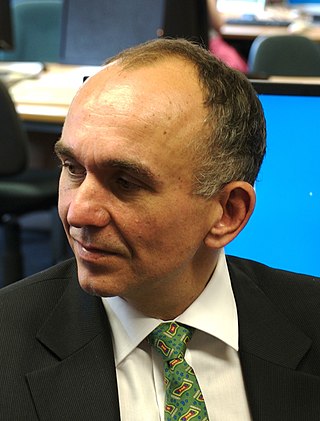
Peter Douglas Molyneux is an English video game designer and programmer. He created the god games Populous, Dungeon Keeper, and Black & White, as well as Theme Park, the Fable series, Curiosity: What's Inside the Cube?, and Godus. He currently works at 22cans.

Bullfrog Productions Limited was a British video game developer based in Guildford, England. Founded in 1987 by Peter Molyneux and Les Edgar, the company gained recognition in 1989 for their third release, Populous, and is also well known for titles such as Theme Park, Magic Carpet, Syndicate and Dungeon Keeper. Bullfrog's name was derived from an ornament in the offices of Edgar's and Molyneux's other enterprise, Taurus Impact Systems, Bullfrog's precursor where Molyneux and Edgar were developing business software. Bullfrog Productions was founded as a separate entity after Commodore mistook Taurus for a similarly named company.
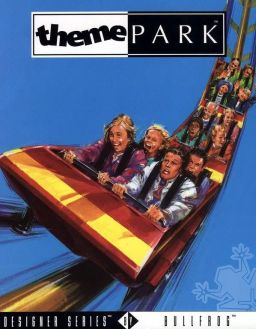
Theme Park is a construction and management simulation video game developed by Bullfrog Productions and published by Electronic Arts in 1994. The player designs and operates an amusement park, with the goal of making money and creating theme parks worldwide. The game is the first instalment in Bullfrog's Theme series and their Designer Series.
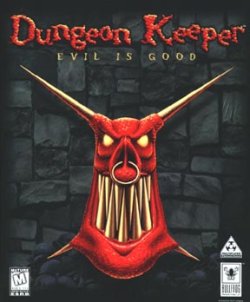
Dungeon Keeper is a strategy video game developed by Bullfrog Productions and released by Electronic Arts in June 1997 for MS-DOS and Windows 95. In Dungeon Keeper, the player builds and manages a dungeon, protecting it from invading 'hero' characters intent on stealing accumulated treasures, killing monsters and ultimately the player's demise. The ultimate goal is to conquer the world by destroying the heroic forces and rival dungeon keepers in each realm. A character known as the Avatar appears as the final hero. Dungeon Keeper uses Creative Technology's SoundFont technology to enhance its atmosphere. Multiplayer with up to four players is supported using a modem, or over a local network.

Theme Hospital is a business simulation game developed by Bullfrog Productions and published by Electronic Arts in 1997 for MS-DOS and Microsoft Windows compatible PCs in which players design and operate a privately owned hospital with the goal of curing patients of fictitious comical ailments. The game is the thematic successor to Theme Park, also produced by Bullfrog, and the second instalment in their Theme series, and part of their Designer Series. The game is noted for its humour, and contains numerous references to pop culture.

Syndicate is an isometric real-time tactical and strategic game from Bullfrog Productions created in 1993, and released for a variety of platforms beginning with the PC and Commodore Amiga. It is the first title in the Syndicate series. Set in a dystopian future in which corporations have replaced governments, Syndicate puts the player in control of a corporation vying for global dominance.

Syndicate Wars is an isometric real-time tactical and strategic game, developed by Bullfrog Productions and published by Electronic Arts. It was released for DOS in 1996 and for the PlayStation in 1997. It is the second video game title in the Syndicate series, retaining the core gameplay and perspective of the original Syndicate, but with a setting 95 years further into the future.
A spiritual successor is a product or fictional work that is similar to, or directly inspired by, another previous work, but does not explicitly continue the product line or media franchise of its predecessor, and is thus only a successor "in spirit". Spiritual successors often have similar themes and styles to their source material, but are generally a distinct intellectual property.

Syndicate: American Revolt is an expansion set designed for the Bullfrog strategy game Syndicate. During the game, the player leads a four-man team of cyborgs through the streets of a dark, dystopian world and through 21 difficult missions.

Russell Shaw is a BAFTA nominated British composer and sound designer. He is known for his work in many video games, particularly those designed by Peter Molyneux.

Syndicate is a 2012 cyberpunk first-person shooter video game developed by Starbreeze Studios and published by Electronic Arts. The game was released for PlayStation 3, Windows, and Xbox 360 in February 2012.
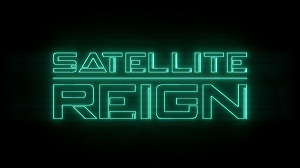
Satellite Reign is a cyberpunk real-time tactics video game developed and published by 5 Lives Studios. The game was released for Windows, macOS, and Linux in August 2015. It is a spiritual successor to the Syndicate series, which co-founder and programmer Mike Diskett had worked on. The name of the game is derived from one of the weapons featured in Syndicate Wars called "Satellite Rain". It received positive reviews from critics.
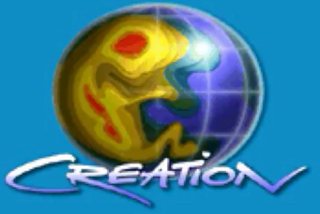
Creation was a cancelled real-time strategy video game developed by Bullfrog Productions as a spin-off of their Syndicate series of real-time tactics games. Set on an alien water world, a player-controlled submarine is tasked with looking after marine life and defending it from the Syndicate, who run planet Earth.

Les Edgar is an entrepreneur, known for being the co-founder and joint managing director of Bullfrog Productions, which he set up with Peter Molyneux. After Bullfrog's acquisition by Electronic Arts in 1995, Edgar became a vice president there. Edgar left Bullfrog in 1999, and eventually left the video gaming industry for the automotive industry, where he reintroduced Aston Martin to racing, and became chairman of TVR, which has, under his leadership, set up partnerships with Gordon Murray and Cosworth. Edgar has stated that he intends to return TVR to Le Mans 24 Hours.

Lost Toys Ltd. was a British video game developer founded in March 1999 by Glenn Corpes, Jeremy Longley, and Darran Thomas, all of whom had previously worked for Bullfrog Productions. Les Edgar helped by providing financial support. Lost Toys was the third Bullfrog break-off group, after Mucky Foot Productions and Lionhead Studios, and was founded due to disillusionment after Electronic Arts purchased Bullfrog.

















